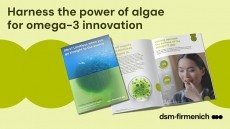Fish oil forms: Triglycerides better for omega-3 index increase

Scientists from Leibniz Universitat Hannover and Ludwig Maximilians University in Munich report that the omega-3 index – a quantification of the fatty acid status of a person – increased “faster and higher” when supplementation used omega-3s in the triglyceride form, compared with the ethyl ester form.
Writing in the European Journal of Clinical Nutrition, the scientists report that six months of supplementation with EPA (eicosapentaenoic acid) and DHA (docosahexaenoic acid) in the triglyceride form increased the omega-3 index by 197 percent, compared with 171 percent following supplements of EPA and DHA in their ethyl ester form.
“As the resulting omega-3 index was significantly higher after n-3 fatty acid- re-esterified triglycerides (FA-rTG) administration compared with n-3 fatty acid-ethyl ester (FA-EE), the results indicate that n-3 FA-rTG is superior to n-3 FA-EE in view of the EPA + DHA tissues incorporation following a long-term administration,” wrote the researchers, led by Leibniz’s Juliane Neubronner.
Heart health and beyond
The heart health benefits of consuming oily fish, and the omega-3 fatty acids they contain, are well-documented, being first reported in the early 1970s by Dr Jorn Dyerberg and his co-workers in The Lancet and The American Journal of Clinical Nutrition. To date, the polyunsaturated fatty acids (PUFAs) have been linked to improvements in blood lipid levels, a reduced tendency of thrombosis, blood pressure and heart rate improvements, and improved vascular function.
Beyond heart health, omega-3 fatty acids, most notably EPA and DHA, have been linked to a wide-range of health benefits, including reduced risk of certain cancers, good development of a baby during pregnancy, joint health, and improved behaviour and mood.
Despite such benefits there are still problems with ensuring adequate omega-3 intakes from fatty fish. This has led to a fleet of omega-3-rich concentrates becoming available. Projections by Frost & Sullivan set annual growth for the omega-3 market at an impressive 24 per cent, and the market is estimated to be worth $1.6bn by 2014.
Omega-3 forms
Various forms of concentrated omega-3 fatty acids are available on the market, and these include free fatty acids (FFA), ethyl esters (EE) or as re-esterified triglycerides (rTG).
Only recently, Dr Dyerberg his Danish co-workers reported that the bioavailability of omega-3s in the re-esterified triglyceride was 50 percent higher than omega-3 in the form of free fatty acids or ethyl esters (Prostaglandins, Leukotrienes and Essential Fatty Acids, Vol. 83, pp. 137-141).
The new study also found that the re-esterified triglycerides form of omega-3s performed better than their ethyl ester form. The German researchers recruited 150 volunteers ad randomly assigned them to one of three groups: One group received fish oil concentrate as reesterified triglycerides (1.01g EPA + 0.67g DHA); the same doses of fish oil concentrate but as ethyl ester; or placebo (corn oil).
Results of the double-blinded placebo-controlled trial showed that EPA and DHA increases were both quicker and more when omega-3 was supplemented in its triglyceride form.
“However, whether this difference would result in differences in clinical outcomes (that is, reduction in serum TG levels, reductions in coronary heart disease events) is unclear and needs further investigations,” wrote the researchers.
“Nevertheless, these obvious differences between rTGs and EEs should be considered in the n-3 fatty acid intake recommendations,” they concluded.
Source: European Journal of Clinical Nutrition
Published online ahead of print, doi: 10.1038/ejcn.2010.239
"Enhanced increase of omega-3 index in response to long-term n-3 fatty acid supplementation from triacylglycerides versus ethyl esters"
Authors: J. Neubronner, J.P. Schuchardt, G. Kressel, M. Merkel, C. von Schacky, A. Hahn















